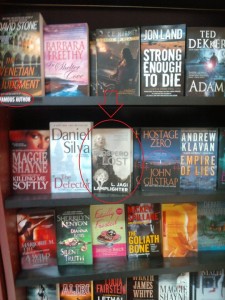Gah! I just realizes that Wednesday rolled around, and I didn’t post anything. But I have an excuse. I was reading. In particular, I was reading the manuscript of a fellow writer.

Books, in all their glory!
(Circle pointing at my book added by a friend. ;-)
Writers write. We also read. In particular, we read stuff written by other writers, and we ask them to read our stuff. This is an invaluable process without which the flow of good literature might stop.
Some writers I know do not bother with a Beta Reader. Personally, I do not think I could get by without one…or several. I just seem to take a lot of things for granted when I write. Only when someone else reads it and goes “what the heck did you mean here?”, and I correct it, does my prose take on a quality worth reading by others.
I wish this were not so. I wish I could write on my own and get it right.
But I am so VERY, VERY grateful for those who help me out by reading the mess that is my early versions!
But with this blessing comes responsibility. In this case, to return the favor and read the works of one of my Beta Readers. It took me three days to read the whole thing…a very enjoyable three days, thought I fear I was not the best Beta Reader. I noted a few bigger things that I thought were important, but mostly I glided along enjoying the ride.
Which I suppose is a complement to the story in itself.
So, the question becomes: what makes a good Beta Reader? What should a Beta Reader comment on?
To some degree, there are a million answers to this. I appreciate the folks who correct my punctuation just as much as the ones who point out major—or minor—errors in plot, background, or emotion.
The first answer is: whatever they are good at noticing. The second answer is: whatever the writer asks them to take a look at.
Take emotions. Emotion is one of the hard things for me—making it clear to the reader what the character is feeling. Luckily, a few of my Beta Readers are good at catching that. So, I can say, let me know where the emotions are not coming across or where you wonder what she’s feeling.
Another big problem for me is that I’m writing about stuff I’ve known about for years. Sometimes I forget what others don’t know about it. It takes a simple question from a Beta Reader “what do you mean, her head is on fire?” to remind me that not everyone knows about Flameheads…or whatever the particular may be.
(Flameheads were made up for this example. No actual Beta Readers were tortured by having to read about Flameheads.)
Another thing that makes a good Beta Reader is: some good, some bad.
What I mean by this is: taking the time to note both things that could be improved and things we like. Whenever I read someone else’s stuff. I do two things. I spend time thinking about what doesn’t work for me in order to try to put my finger on exactly what is making it not work. That’s the bad. But I also try to make a note of things I like. Sometimes, it’s easy to get to the end of a work and carefully note what you think needs to be changed and not remember to complement the author on the stuff that worked, the stuff you liked, the funny stuff, the touching stuff…whatever it is that does work.
Even the best works can usually use some kind of improvement…even if just in clarifying some phrase that is not entirely clear. Even the worst work usually has some good, some spark of creativity or insight to it.
The job of the Beta Reader is to find these things and draw them out…so that the work can shine all the more in its polished form.
Any other advice you would share with Beta Readers? Or things that have worked—or not worked—for you?



